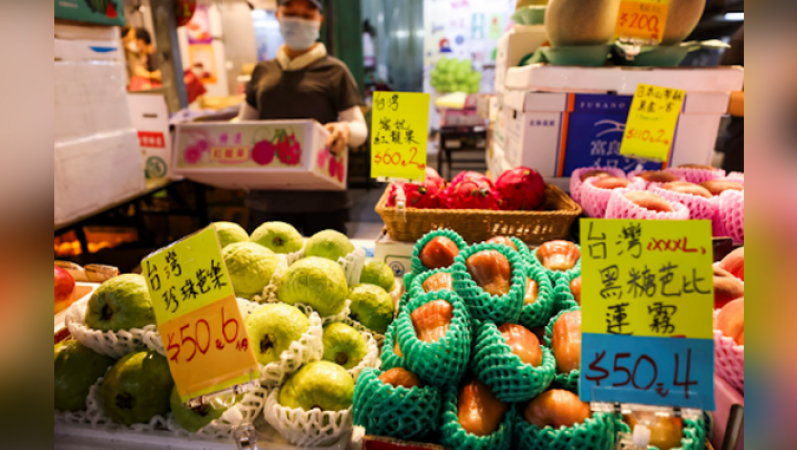
China:
China: Su Yu, a resident of Guangzhou, seeks out the Taiwanese fruit because she believes it is healthier than the Chinese mainland food.
But he claimed it was already becoming difficult to find before Beijing imposed restrictions on many food imports from the island earlier this month.
Su, a translator of a Japanese-owned business in the port city to the northwest of Hong Kong, said: "The fruit, labeled Taiwanese native, gives me the impression that I haven't seen any in a very long time.
In the coming months, the task will only get harder. After US House Speaker Nancy Pelosi disregarded warnings and paid a quick visit to Taiwan, which Beijing sees as a renegade province that needs to be united with the mainland, China ordered Taiwan's bread, Citrus fruits and packaged teas were banned.
The US and other nations with diplomatic relations with Beijing accept the one-China doctrine, according to which Taiwan is part of China, but they oppose any attempt to occupy the island militarily.
According to French investment bank Natixis, agricultural export restrictions represent just 0.2% of Taiwan's total exports to mainland China in dollar terms. However, this is likely to be disappointing for customers like Su.
According to Jolly Chan, a Taiwanese food enthusiast who has lived in Hong Kong for 36 years, diners in Hong Kong and mainland enjoy a variety of Taiwanese flavors, often Japanese cuisine from different regions of China rather than one. And mix the accents. Areas like Sichuan or Shanghai.
When Tokyo colonized the island between 1895 and 1945, it was thought that the Japanese farming methods used to grow Taiwanese fruit and tea leaves at higher altitudes were "advanced". She claimed that compared to their mainland counterparts, they tasted more subtle or earthy today.
According to Chan, the people of the region believe that Taiwanese cuisine is quite unique, different from the cuisine found in Guangdong and Sichuan. Most of it has a strong aroma.
Pun's Food in Hong Kong's Causeway Bay neighborhood, which is home to everything from fast food joints to fine dining establishments, regularly has a line outside the door and can easily accommodate more than 40 of its seats during peak hours. can fill.
The four-year-old restaurant imports 90% of its food from Taiwan, which includes two different types of tea, green and oolong, as well as items such as pineapple, mango, rice noodles, squid balls, and pineapple. One of the restaurant's walls is covered with a picture of former Taiwanese President Ma Ying-jeou.
Taiwanese sweets have a pleasant "internal aroma", according to duty manager Chung Siu-ling.
Susan Chang buys six pastries covered with matcha tea powder over lunch break from Wheat Cake Bakery, a block away. The beauty parlor employee claimed that the sign that read "Taste of Taiwan Old Fashioned" drew her in.
Chang, 32, said: "That must mean it takes you back to the source.
Prices in other parts of Hong Kong reflect the popularity of Taiwanese cuisine.
Taiwan oolong costs more than HK$200 (US$26) for a fist-sized sack at a shopping center kiosk run by Hong Kong-based company Ying Kee Tea House, nearly three times more than comparable tea from Fujian province. With a climate similar to Taiwan, Fujian is located in the Taiwan Strait.
Hong Kong's leader has promised to assist Beijing with "all necessary measures" to support national sovereignty, despite the fact that the city has not banned agricultural products from the mainland as well as Taiwan.
Unable to confirm whether the region is considering any import restrictions from Taiwan, a spokesman for the Hong Kong Trade and Industry Department declined to comment.
In 2021, trade in both directions between Taiwan and the mainland totaled US$328.3 billion.
Taiwan exported citrus products worth $554 million last year, of which $317 million went to mainland China and the rest to Hong Kong. About $42 million worth of tea was exported last year, of which $32 million was bought by the mainland.
According to Chinese officials, imports of citrus fruits from Taiwan have been halted because previous shipments contained too many leftovers of two different pesticides.
Data from the Taiwan Council of Agriculture shows that nearly a quarter of Taiwan's annual 57,000 metric tons of custard apple crop is exported, with 95% of shipments going to the mainland.
90% of Taiwan's pineapple exports and almost all wax apple exports go to the mainland.
Li Zong, seller of the largest wholesale fruit and vegetable market of its kind at Jiangnan Market in Guangzhou, China, claims that no one is now bringing Taiwanese pineapples, wax apples or custard apples. He claimed that those fruits were hardly available for two years.
According to Li, the shortage of high-end foods was a result of COVID-19 containment measures, slow income growth in China and other factors.
China's film authority uses discount coupons to entice moviegoers and boost the stagnant industry